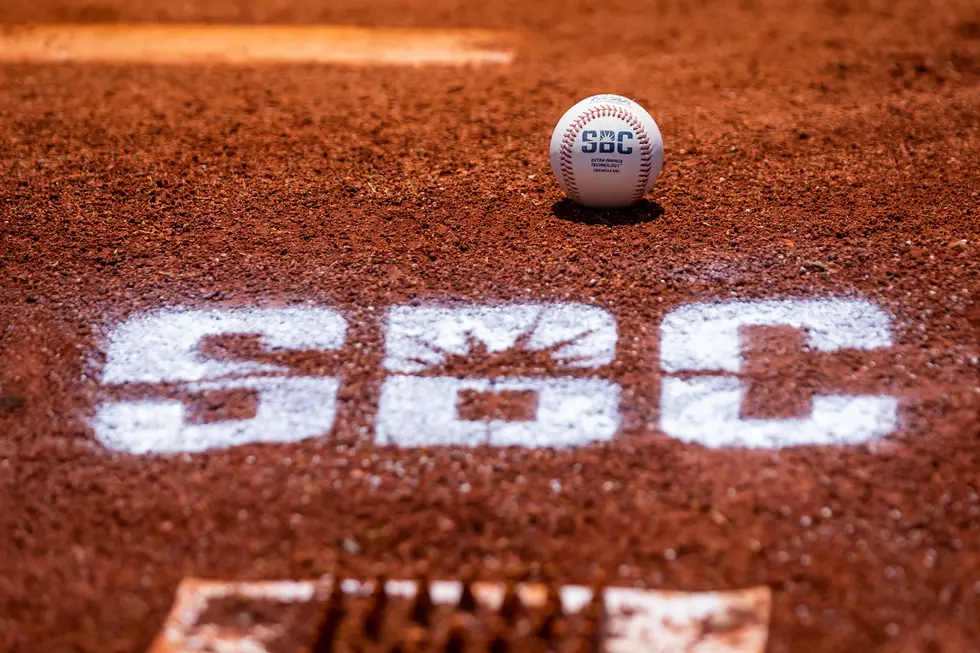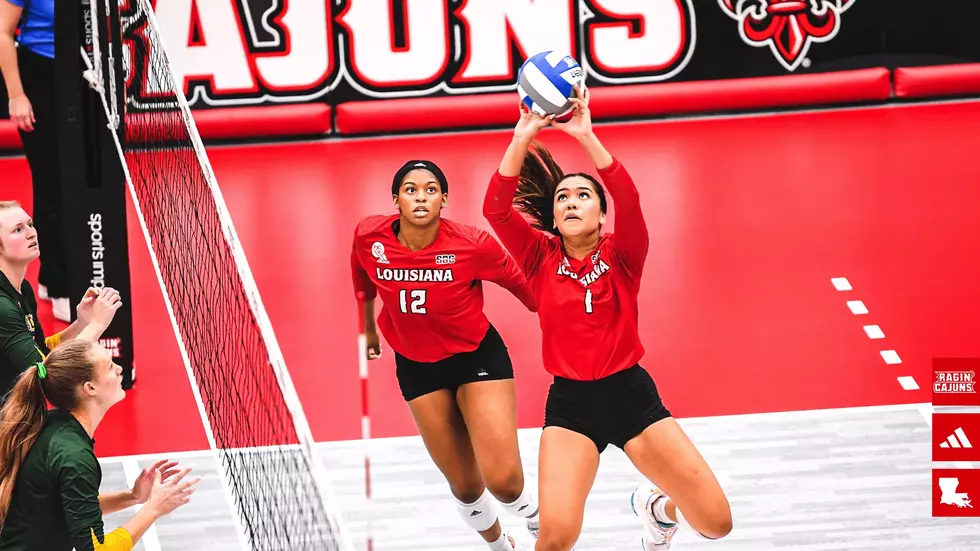
Coach’s Corner: With Michael Lotief
To be a champion, either as an individual, or as a team, you have to learn how to deal with failure. It's those individuals, and teams, that learn how to deal with failure, and how to bounce back from it, that have a better chance of reaching lofty goals than those that don't. In this week's edition of "Coach's Corner", UL co-head softball coach Michael Lotief discusses how to deal with failure with his "Those That Failure Cannot Break Are Those That Become Champions" blog. View this week's segment, below.
THOSE THAT FAILURE CANNOT BREAK ARE THOSE THAT BECOME CHAMPIONS
Everybody fails. Woody Allen said it best, “If you’re not failing, you’re not trying anything.” In sport, failure is built into the game. Dealing with failure is part of the challenge athletes must learn to cope with. When an athlete fails, it is usually “on the big stage”, so everybody can witness it. And if that is not bad enough, then it gets replayed over and over again on the TV highlights. In sports, there is always going to be someone who wins and someone who loses; someone who had success and someone who failed. If it is a pitcher-hitter dual, one will win and one will fail. Once teams get into the play-offs, one team will advance (win) and one team will not (fail). Failure is part of the process; NOBODY is exempt from it. NOBODY. What distinguishes us is HOW WE DEAL WITH IT. Failure will either break you or make you! Winston Churchill actually defined success as dealing with failure in a positive way -- “Success is going from failure to failure without loss of enthusiasm.” Your choice!
Did anybody watch the Masters? Rory McIIroy, the 21-year-old golfer, began Sunday's final round of the Masters with a 4-stroke lead. By the end, he shot an 8-over-par 80 to free fall to a tie for 15th and a full 10 strokes behind the eventual winner. From phenom to failure in a single, agonizing afternoon. What happened? Was it the challenge of Augusta National golf course (the game)? Was it the pressure of winning the Masters (the green jacket)? How can you lead the golf tournament for 63 holes and then just fall apart? Admit it -- you thought he would win. I did. McIlroy is the the ninth-ranked player in the world. What happened on Sunday? He certainly did not have his best performance on the biggest stage. On the par-4 10th hole, he hooked a drive, going where no pro has ever gone before: in between the cottages located far, far to the left of the fairway. The commentator said, "It's moments like this that the game becomes very cruel." Triple-bogey 7. His lead was forever gone. He bogeyed No. 11. Doubled No. 12. "He just wants to creep away now.” He snapped his drive into Rae's Creek on No. 13. McIlroy dropped his head on his right forearm, his body slumped in confusion and embarrassment. At that moment, I wondered what was he thinking. What would I be thinking? What could I do to get back on track? Did he let the failure “break him” at that moment? He bogeyed No. 15. By the time he staggered off the 18th green for a back-nine 43, his shirt tail hanging out of his pants, McIlroy had made the wrong kind of Masters history: a tie for the worst final round by a 54-hole leader.
How did the 21 year old respond afterwards when being interviewed? Like a champion: "It was a character-building day, put it that way," McIlroy said. "I'll come out stronger for it." In other words, the failure may have temporarily broken him out on the course, but sounds like he intends to use that experience of failure to make him better and stronger for next time. After such a monumental collapse, what would you say or do? What would be your next step? Would you be ready to go back to work? Would you dare pick up a club again and swing it in a Masters on ESPN for the world to critique?
When you think of Abraham Lincoln, what is the first thing that comes to your mind? President of the United States of America? Honest Abe? 4 score and 7 years ago? The Civil War? FAILURE? Abe Lincoln and failure do not seem to go together from what I learned in American history. But Lincoln may be the most famous “ICON” in American politics who overcame failure to achieve great success. The following are a listing of his failures:
- Defeated for legislature, 1832
- Failed in business, 1833
- Sweetheart (Ann Rutledge) died, 1835
- Had nervous breakdown, 1836
- Defeated for Speaker, 1838
- Defeated for nomination for Congress, 1843
- Lost renomination to Congress, 1848
- Rejected for Land Officer, 1849
- Defeated for Senate, 1854
- Defeated for nomination for Vice-President, 1856
- Again defeated for Senate, 1858
My great concern is not whether you have failed, but whether you are content with your failure.” – Abraham Lincoln
Most of us would QUIT or not “run for office again” after losing. Lincoln lost 7 elections. After the second or third time, most of us would be content with our failure and say “it’s not meant to be”. Losing and failure bring unpleasant emotions and feelings and thoughts. Those BROKEN by failure are haunted by unpleasant memories. Those memories are like shadows that lurk EVERYWHERE -- in front, behind, beside, beneath and above. It is also a cage that traps the mind, preventing it from entertaining the possibilities of success. After monumental failures, there are MANY who are convinced that they cannot do it; therefore, they will never try again; they will never put themselves in “that position” to experience those unpleasant thoughts, feelings and emotions ever again.
FOR THOSE THAT FAILURE CANNOT BREAK ARE THOSE WHO BECOME CHAMPIONS. FAILURE to them is not a ghost, but A FRIEND who taught them well. It is also a stepping stone to wisdom. They are convinced that true failure only happens when one gives up. We are all of frail humanity; we all have moments where we are fragile; but the game gives us chances to redeem ourselves and go at it again and an opportunity to prove that we will never give up. Those champions are resolved not to let the failures break them – but instead, use it as an opportunity to build character and learn and grow from the experience, so next time we are stronger and maybe a little less fragile and frail and thus tougher to break.
To me, that is the greatest lesson of Abraham Lincoln. After every failure or lost election he may have been temporarily broken, but he “stayed at it” and “moved on stronger” and kept pursuing his dreams and the world is better for it. For example in 1832, the same year Lincoln was defeated for the state legislature, he was elected company captain of the Illinois militia and he was appointed postmaster. In 1834 he was elected to the Illinois state legislature just a year after failing in business. After his sweetheart died (1835) and he had a nervous breakdown (1836), Lincoln found the resolve to be re-elected to Illinois state legislature in 1836 and also received his license to practice law in Illinois state courts (1836). After being defeated for nomination to Congress in 1843, Lincoln was elected to Congress in 1846. In 1854, he was elected to Illinois state legislature but declined the seat to run for US Senate. After being defeated for the US Senate seat in 1854, then being defeated in his nomination for Vice-President in 1856 and then again being defeated for the US Senate in 1858, he was elected PRESIDENT OF THE UNITED STATES OF AMERICA.
FAILURES DO NOT STOP CHAMPIONS. They keep moving forward. If you experience defeat, that does not mean you are a failure. Failures are only permanent if we stop trying. The only real failure is the failure not to move on. The ONLY way to deal with failure is to learn from it and move on. For those that FAILURE CANNOT BREAK are those that become CHAMPIONS!
In team sports (versus golf or American politics), when you think of epic collapses or failures, I think of the New York Yankees (the highest payroll team) in the 2004 ALCS vs. the Boston Red Sox. The Yankees were just 3 outs away from sweeping the Red Sox and advancing to the World Series. The Yankees lost 6-4 in 12 innings in that game 4. And then proceeded to lose the next 3 games and became the first team in baseball history to blow a best-of-seven series after leading 3 games to zero. This was a Yankee team that had won 4 previous Championships and had its core nucleus in place. How does that happen? How can you be up 3 games to zero and just 3 outs away from sweeping your opponent, and then every thing turns against you? How can the most storied franchise in baseball hold the distinction for being the first and only one to blow a best-of-seven series after leading 3 games to zero?
When documenting epic collapses or noting monumental failures, it must be noted that the GOLFER or POLITICIAN or TEAM has to have done something very successful at the outset to be in the position to have a collapse. It is probably appropriate to acknowledge that you have to be a “pretty good team” to be in the World Series in the first place. Also, if you continue to have successful seasons and successful runs in the post season then failure is surely right around the corner too. Success and failure go together. You don’t have one without the other. McIIroy has to be “a great golfer” to lead the Masters and this year’s field for all of the first 3 rounds. Lincoln had to be a great politician to win the elections he won; if you continue to run for election, eventually you are going to lose or experience failure – especially if you continue to set your goals higher and higher; i.e. Lincoln went from running for the state legislature, to Congress, to US Senate, to Vice-President and then President. As these competitors and teams continue to aspire to win and have success at higher and higher levels, we all realize that the risks of failure increases exponentially. The golfers in the Masters all had to qualify and prove themselves on other levels and win consistently before getting a chance to play in one of the sports MAJOR tournaments. The politician who becomes President has spent years and years building a base and running for office and assembling a grass root team and has WON more often than not. The MLB baseball player has gone through the minors and AAA and bus rides and has proven himself to be worthy of this chance to fail on the big stage by being highly talented and successful.
The Yankees found a way (signed Alex Rodriquez, CC Sabathia, Johnny Damon, ETC) to learn from their failure and eventually won the World Series in 2009 as opposed to the Chicago Cubs who had a similar collapse in the 2003 play-offs and are still talking about the curse of Steve Bartman (the fan who reached over the left field wall to prevent Moises Alou from catching the ball). The core group of Yankees: Derek Jeter, Jorge Posada, Andy Petite and Mariana Rivera have won 5 Championships (1996, 1998, 1999, 2000 and 2009). After the initial 4 Championships in 5 years, this group has had to deal with more disappointments than successes in post-season play. In 2001, vs. the Arizona Diamondbacks, the Yankees lost the World Series when closer Rivera uncharacteristically blew a save in the bottom of the 9th inning of game 7. In 2003, despite having the best league record (101-61), the Yankees lost the World Series in 6 games to the “small market”, smaller payroll, penny pinching, Florida Marlins, making them the first Yankee team since 1981 to lose the World Series at home. And of course, in 2004 the Yankees blew the 3-0 series led vs. the Red Sox and ended up losing the series. BTW, I am not a Yankee fan; but the lesson learned about their organization is not the listing of the championships or the epic collapses; what is admirable is that this organization is committed to winning and is committed to excellence, and despite failures, it continues to do what is necessary to put itself in a position to have success.
As I have gone through life, I have experienced successes and failures. We all realize that in most endeavors, there is either going to be a good result (win/success) or a bad ending (loss/failure). Going into those endeavors, we probably have gone through the countless different scenarios in our minds. We all have “negatives” running around in our minds AND we all have positive ones too. Every negative sense/thought has a counter-balancing positive thought/sense to replace it with. FEAR can be CONFIDENCE. NERVOUSNESS should be POSITIVE ANTICIPATION. REJECTION ought to be DETERMINATION. PROCRASTINATION – ACHIEVEMENT. RATIONALIZATION – WINNING. SELF-DOUBT – SUCCESS. UNCERTAIN – CERTAIN. DOOM & GLOOM – OPTIMISM. UNLUCKY – HARD WORK.
Here are some thoughts from champions who experienced failure and did not break. Use their thought processes to help you deal with failure successfully. Refuse to break. Henry Ford believed that "Failure is only an opportunity to begin again more intelligently." "The greatest general is he who makes the fewest mistakes." Napoleon Bonaparte. St. Augustine said "It is human to err, but it is devilish to remain willfully in error." Confucius said, "A man who has committed a mistake and doesn't correct it is committing another mistake." Tom Peters says, "Only with failure can you verify wrong ways of doing things and discard those practices that hinder success." "I think and think for months, for years. Ninety-nine times the conclusion is false. The hundredth time I am right," according to Albert Einstein. John McEnroe says "The important thing is to learn a lesson every time you lose". Pro golfing legend Lee Travino said, "We all choke, and the man who says he doesn't choke is lying like hell. We all leak oil."
We are all fragile, and “leaking oil”, ready to burst at the wrong time. Be secure in your human imperfection by learning and growing from each experience, and remaining resolved to keep chasing after success. FOR THOSE THAT FAILURE CANNOT BREAK ARE THOSE THAT BECOME CHAMPIONS!
PRACTICE/GAME NOTES: There are plenty of UPS and DOWNS in performances. In the FIU series, I thought we made a lot of uncharasteristic mistakes. In the South Alabama series, I felt as though we were at the top of our game. What’s the difference? I don’t know; but I do know that in human performances there are many UPS and DOWNS. Just like with success and failure, the key is to learn and grow from the experiences and move on…You can all be proud of this group because they work extremely hard and are fierce competitors and IT matters to them…Hopefully we can “GET HEALTHY”; after Taryn got the cast off of her leg (broken ankle), she sprained her ankle while taking batting practice swings. Then in the South Alabama series, Gabby sprained her ankle while running the bases. Maybe the lesson the game is trying to teach us by continuing to have “starters” get injured and miss substantial playing time IS: we have to get OTHERS better and stronger; this is not about one or two or three individuals; it is about how strong we can be as a TEAM; this team is united and together and now the challenge is to see if they can get their skills to a championship level. It was good to see Brianna Cherry, Sarah Drahiem, Paige Cormier, Katie Smith & Erikka Murphy “step up” last week…Everybody keeps asking me about the progress of the stadium – we are still moving forward; there is progress, too slow for some but progress in my eyes. To put it in perspective: AS IS, OUR STADIUM is the nicest one we have played in ALL YEAR. It is going to be AWESOME and well worth the wait. Don’t look for somebody to blame, instead look for somebody or something to be thankful for.
GOOD TIMES -- A LOOK BACK: 2005
The 2005 Cajuns offense was balanced from top to bottom: Cajuns with 30 plus hits: Danyele Gomez (65), Jill Robertson (64), Brittany Bryant (50), Lacey Bertucci (40), Joy Webre (38), Crystal George (35) and Ashley Evans (34). Cajuns with 20 plus runs: Jill Robertson (57) [Robertson became the fourth player to reach 200 runs scored in a career and ended with 208], Danyele Gomez (47), Brittany Bryant (38), Lacey Bertucci (33), Tiffany Hebert (32), Joy Webre (27) and Ashley Evans (26). Cajuns with 20 plus RBI: Danyele Gomez (65), Lacey Bertucci (46), Joy Webre (36), Brittany Bryant (34), Ashley Evans (28), and Jill Robertson (25). Brooke Mitchell recorded her 1,000th strikeout on 02/06/05. She became the FIRST player in the history of Ragin’ Cajuns softball to reach 1,000 career strikeouts and became only the 28th player in NCAA history to reach the milestone; she finished her career with 1309. Mitchell also took over in CAREER VICTORIES (119). The Ragin’ Cajuns recorded the 1,000th victory in program history on April 20, 2005 – in its 25th season. UL joined the likes of Arizona, UCLA, CAL, Arizona State, and Michigan as programs in NCAA Divison 1 that have reached 1,000 wins. Danyele Gomez posted 20 homeruns for the second time in her career. She earned Sun Belt Player of the Year honors and was a member of the NFCA Division 1 All-American Team. Joy Webre started every game for the fourth straight season and she ended her career as the all-time leader in career putouts (1,818). Brittany Bryant went through the regular season with a .300 or above batting average and earned NFCA All-south Region honors. Lacey Bertucci finished the season with a personal-best 16 homeruns and ended the month of February with a .420 average. The Cajuns finished the season 51-10; the Cajuns won the regular season Sun Belt title with a 19-1 record and won the Sun Belt conference Tournament Championship. The Cajuns entered the 2005 NCAA Regional in Norman, OK on a hot streak – winning 28 of its last 29 games.
2005 marked the end of our 1st recruitng class’ careers (our BABIES) – Brooke Mitchell, Joy Webre, Jill Robertson (although Jill was signed the year before, we claim her b/c she played travel ball for Coach Stef and the Image since she was 13), Tiffany Hebert, Crystal George (who played for me and the Reflections since she was 12). That group built the FOUNDATION for our tenure – 208 WINS (2002:50-13, 2003:47-11, 2004:60-8, and 2005:51-10), 4 Sun Belt Conference Championships, 4 Sun Belt Tournament Championships, 4 NCAA Regional Appearances with 3 Regional FINALS and 1 NCAA Regional CHAMPIONSHIP, and 1 NCAA WOMEN’S COLLEGE WORLD SERIES. If you want to really stroll down memory lane, I encourage you to get out your copy of the 2005 Media Guide and read their Senior MEMOIRS. I’ll end it with a quote from one of their MEMOIRS: “Of course, I will remember the victories and triumphs, but I will never forget the moments when, (I was) at my worst, I still felt the love, support and trust of my teammates, coaches, fans and my family…that’s the most beautiful part of being a RAGIN CAJUN….thanks for believing in a plug like me and giving me the opportunity of a lifetime”. We all should really THANK them for being plugs; for believing and trusting in the DREAM; for making all around them (including US) better; for showing up and working hard and getting better day by day; for having the BEST attitudes; and for MAKING IT HAPPEN! GOOD TIMES – GREAT MEMORIES – LOTS OF FUN – GOOD STUFF – CHAMPIONS!
Remember to tune in to the COACHES SHOW on www.espn1420.com on Monday’s at noon; listen LIVE to the games on www.espn1420.com; and check out the “stinking genius”, Stevie P. on THINKING OUT LOUD Monday thru Friday from 7 a.m. to 9 a.m. as he discusses sports and always gets around to giving his opinions on Ragin’ Cajuns Softball. GEAUX CAJUNS!!!
More From 103.3 The GOAT









